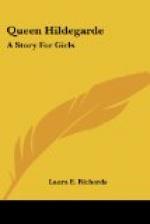“Why, you poor lad, so you haven’t!” said Hildegarde. “But you shall have it; I will tell it to you as we walk back to the farm. Which one will you have,—or shall I tell you a new one?”
The blue eyes sparkled with the delight of anticipation. “Oh, please!” he cried; “the one about the bold Buckle-oh!”
Hilda laughed merrily. “The bauld Buccleugh?” she repeated. “Oh! you mean ‘Kinmont Willie.’ Yes, indeed, you shall have that. It is one of my favorite ballads, and I am glad you like it.”
“Oh, I tell yer!” cried Bubble. “When he whangs the table, and says do they think his helmet’s an old woman’s bunnit, an’ all the rest of it,—I tell ye that’s some, Miss Hildy!”
“You have the spirit of the verse, Bubble,” said Hilda, laughing softly; “but the words are not quite right.” And she repeated the splendid, ringing words of Buccleugh’s indignant outcry:
“Oh! is my basnet
a widow’s curch,
Or my lance a
wand o’ the willow-tree,
Or my arm a lady’s
lily hand,
That an English
lord should lightly me?
“And have they
ta’en him, Kinmont Willie,
Against the truce
of Border tide,
And forgotten
that the bauld Buccleugh
Is warden here
o’ the Scottish side?
“And have they
e’en ta’en him, Kinmont Willie,
Withouten either
dread or fear,
And forgotten
that the bauld Buccleugh
Can back a steed
or shake a spear?”
Zerubbabel Chirk fairly danced up and down in his excitement “Oh! but begin again at the beginning, please, Miss Hildy,” he cried.
So Hilda, nothing loth, began at the beginning; and as they walked homeward, recited the whole of the noble old ballad, which if any girl-reader does not know, she may find it in any collection of Scottish ballads.
“And the best of it is, Bubble,” said Hilda, “that it is all true,—every word of it; or nearly every word.”
“I’ll bet it is!” cried Bubble, still much excited. “They couldn’t make lies sound like that, ye know! You kind o’ know it’s true, and it goes right through yer, somehow. When did it happen, Miss Hildy?”
“Oh! a long time ago,” said Hildegarde; “near the end of the sixteenth century. I forget just the very year, but it was in the reign of Queen Elizabeth. She was very angry at Buccleugh’s breaking into Carlisle Castle, which was an English castle, you see, and carrying off Lord Scroope’s prisoner; and she sent word to King James of Scotland that he must give up Buccleugh to her to punish as she saw fit. King James refused at first, for he said that Lord Scroope had been the first to break the truce by carrying off Kinmont Willie in time of peace; but at length he was obliged to yield, for Queen Elizabeth was very powerful, and always would have her own way. So the ‘bauld Buccleugh’ was sent to London and brought before the great, haughty




